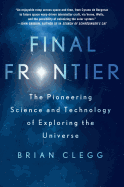
Brian Clegg (Gravity, Extra Sensory) explores the past, present and potentially promising future of space exploration in Final Frontier. He invokes the United States' pioneer spirit and past spaceflight accomplishments, building a step-by-step outline for how we could plausibly become a spacefaring civilization using the latest scientific and technological advances. Clegg is also a realist, devoting only a scant final chapter to the faster-than-light-speed technology that's still based more on science fiction than science fact. He creates a comprehensive (and easily comprehensible) vision of realistic space projects for the near and long term (from within this decade to mid-century), like interplanetary outposts and asteroid mining.
The most immediate advances will almost certainly come from private companies. Clegg respects NASA's history of achievement, but external political forces and a defunct bureaucracy have split the U.S.'s space agency into two parts: one of starry-eyed plans, the other of actual projects, with both sides rarely meeting. It will be up to the likes of billionaire Richard Branson and his company Virgin Galactic to push past the disappointingly stagnant last few decades of space exploration. However, anything beyond the commercialization of low-Earth orbit will require considerably greater resources. Clegg deftly explains the challenges facing outposts on the moon and Mars, beyond even the as-yet-unsolved engineering puzzles; how, for example, could a Mars colony justify its existence economically?
Final Frontier is thorough without being overly complex. Clegg gives brief overviews of the science involved in space flight--just enough information to keep casual readers from getting lost without boring science buffs. --Tobias Mutter, freelance reviewer

